- Home
- Muriel Spark
The Girls of Slender Means Page 3
The Girls of Slender Means Read online
Page 3
Jane Wright could not see why Anne was so concerned about her one inch and a half on the hips more than Selina’s, since Anne was already slender and already fixed up for marriage. She stood on the lavatory seat and threw out Anne’s faded green dressing-gown for her to drape round her slippery body and asked what it was like out there. The two other girls on the floor were away for the week-end on this occasion.
Anne and Selina were peeping over the edge of the flat roof at a point where Jane could not see them. They returned to report that they had looked down on the back garden where Greggie was holding her conducted tour of the premises for ‘the benefit of two new members. She had been showing them the spot where the bomb had fallen and failed to go off, and had been removed by a bomb-squad, during which operation everyone had been obliged to leave the house. Greggie had also been showing them the spot where, in her opinion, an unexploded bomb still lay.
The girls got themselves back into the house.
‘Greggie and her sensations’: Jane felt she could scream. She added, ‘Cheese pie for supper tonight, guess how many calories?’
The answer, when they looked up the chart, was roughly 350 calories. ‘Followed by stewed cherries,’ said Jane, ‘94 calories normal helping unless sweetened by saccharine, in which case 64 calories. We’ve had over a thousand calories today already. It’s always the same on Sundays. The bread-and-butter pudding alone was—’
‘I didn’t eat the bread-and-butter pudding,’ said Anne. ‘Bread-and-butter pudding is suicidal.’
‘I only eat a little bit of everything,’ Selina said. ‘I feel starved all the time, actually.’
‘Well, I’m doing brain-work,’ said Jane.
Anne was walking about the landing sponging off all the margarine. She said, ‘I’ve had to use up soap and margarine as well.’
‘I can’t lend you any soap this month,’ Selina said. Selina had a regular supply of soap from an American Army officer who got it from a source of many desirable things, called the P.X. But she was accumulating a hoard of it, and had stopped lending.
Anne said, ‘I don’t want your bloody soap. Just don’t ask for the taffeta, that’s all.’
By this she meant a Schiaparelli taffeta evening dress which had been given to her by a fabulously rich aunt, after one wearing. This marvellous dress, which caused a stir wherever it went, was shared by all the top floor on special occasions, excluding Jane whom it did not fit. For lending it out Anne got various returns, such as free clothing coupons or a half-used piece of soap.
Jane went back to her brain-work and shut the door with a definite click. She was rather tyrannous about her brain-work, and made a fuss about other people’s wirelesses on the landing, and about the petty-mindedness of these haggling bouts that took place with Anne when the taffeta dress was wanted to support the rising wave of long-dress parties.
‘You can’t wear it to the Milroy. It’s been twice to the Milroy … it’s been to Quaglino’s, Selina wore it to Quags, it’s getting known all over London.
‘But it looks altogether different on me, Anne. You can have a whole sheet of sweet-coupons.’
‘I don’t want your bloody sweet-coupons. I give all mine to my grandmother.’
Then Jane would put out her head. ‘Stop being so petty-minded and stop screeching. I’m doing brain-work.’
Jane had one smart thing in her wardrobe, a black coat and skirt made out of her father’s evening clothes. Very few dinner jackets in England remained in their original form after the war. But this looted outfit of Jane’s was too large for anyone to borrow; she was thankful for that, at least. The exact nature of her brain-work was a mystery to the club because, when asked about it, she reeled off fast an explanation of extreme and alien detail about costing, printers, lists, manuscripts, galleys and contracts.
‘Well, Jane, you ought to get paid for all that extra work you do.’
‘The world of books is essentially disinterested,’ Jane said. She always referred to the publishing business as ‘The world of books’. She was always hard up, so presumably ill paid. It was because she had to be careful of her shillings for the meter which controlled the gas-fire in her room that she was unable, so she said, to go on a diet during the winter, since one had to keep warm as well as feed one’s brain.
Jane received from the club, on account of her brain-work and job in publishing, a certain amount of respect which was socially offset by the arrival in the front hall, every week or so, of a pale, thin foreigner, decidedly in his thirties, with dandruff on his dark overcoat, who would ask in the office for Miss Jane Wright, always adding, ‘I wish to see her privately, please.’ Word also spread round from the office. that many of Jane’s incoming telephone calls were from this man.
‘Is that the May of Teck Club?’
‘Yes.’
‘May I speak to Miss Wright privately, please?’ At one of these moments the secretary on duty said to him, ‘All the members’ calls are private. We don’t listen in.’
‘Good. I would know if you did, I wait for the click before I speak. Kindly remember.’
Jane had to apologize to the office for him. ‘He’s a foreigner. It’s in connexion with the world of books. It isn’t my fault.’
But another and more presentable man from the world of books had lately put in an appearance for Jane. She had brought him into the drawing-room and introduced him to Selina, Anne, and the mad girl Pauline Fox who dressed up for Jack Buchanan on her lunatic evenings.
This man, Nicholas Farringdon, had been rather charming, though shy. ‘He’s thoughtful,’ Jane said. ‘We think him brilliant but he’s still feeling his way in the world of books.’
‘Is he something in publishing?’
‘Not at the moment. He’s still feeling his way. He’s writing something.’
Jane’s brain-work was of three kinds. First, and secretly, she wrote poetry of a strictly non-rational order, in which occurred, in about the proportion of cherries in a cherry-cake, certain words that she described as ‘of a smouldering nature’, such as loins and lovers, the root, the rose, the seawrack and the shroud. Secondly, also secretly, she wrote letters of a friendly tone but with a business intention, under . the auspices of the pale foreigner. Thirdly, and more openly, she sometimes did a little work in her room which overlapped from her day’s duties at the small publisher’s office.
She was the only assistant at Huy Throvis-Mew Ltd. Huy Throvis-Mew was the owner of the firm, and Mrs Huy Throvis-Mew was down as a director on the letter heading. Huy Throvis-Mew’s private name was George Johnson, or at least it had been so for some years, although a few very old friends called him Con and older friends called him Arthur or Jimmie. However, he was George in Jane’s time, and she would do anything for George, her white-bearded employer. She parcelled up the books, took them to the post or delivered them, answered the telephone, made tea, minded the baby when George’s wife, Tilly,. wanted to go and queue for fish, entered the takings into ledgers, entered two different versions of the petty cash and office expenses into two sets of books, and generally did a small publisher’s business. After a year George allowed her to do some of the detective work on new authors, which he was convinced was essential to the publishing trade, and to find out their financial circumstances and psychologically weak points so that he could deal with them to a publisher’s best advantage.
Like the habit of changing his name after a number of years, which he had done only in the hope that his luck would turn with it, this practice of George’s was fairly innocent, in that he never really succeeded in discovering the whole truth about an author, or in profiting by his investigations at all. Still, it was his system, and its plot-formation gave him a zest for each day’s work. Formerly George had done these basic investigations himself, but lately he had begun to think he might have more luck by leaving the new author to Jane. A consignment of books, on their way to George, had recently been seized at the port of Harwich and ordered to be burnt by the local magistrates on the g
rounds of obscenity, and George was feeling unlucky at this particular time.
Besides, it saved him all the expense and nervous exhaustion involved in the vigilant lunching with unpredictable writers, and feeling his way with them as to whether their paranoia exceeded his. It was better altogether to let them talk to Jane in a café, or bed, or wherever she went with them. It was nerve-racking enough to George to wait for her report. He fancied that many times in the past year she had saved him from paying out more ready money for a book than necessary — as when she had reported a dire need for ready cash, or when she had told George exactly what part of ‘the manuscript he should find fault with — it was usually the part in which the author took a special pride — in order to achieve the minimum resistance, if not the total collapse, of the author.
George had obtained a succession of three young wives on account of his continuous eloquence to them on the subject of the world of books, which they felt was an elevating one — he had deserted the other two, not they him — and he had not yet been declared bankrupt although he had undergone in the course of the years various tangled forms of business reconstruction which were probably too much for the nerves of his creditors to face legally, since none ever did..
George took a keen interest in Jane’s training in the handling of a writer of books. Unlike his fireside eloquence to his wife Tilly, his advice to Jane in the office was furtive, for he half believed, in the twilight portion of his mind, that authors were sly enough to make themselves invisible and be always floating under the chairs of publishers’ offices.
‘You see, Jane,’ said George. ‘these tactics of mine are an essential part of the profession. All the publishers do it. The big firms do it too, they do it automatically. The big fellows can afford to do it automatically, they can’t afford to acknowledge all the facts like me, too much face to lose. I’ve had to work out every move for myself and get everything clear in my mind where authors are concerned. In publishing, one is dealing with a temperamental raw material.’
He went over to the corner curtain which concealed a coat-rail, and pulled aside the curtain. He peered within, then closed the curtain again and continued, ‘Always think of authors as your raw material, Jane, if you’re going to stay in the world of books.’ Jane took this for fact. She had now been given Nicholas Farringdon to work on. George had said he was a terrible risk. Jane judged his age to be just over thirty. He was known only as a poet of small talent and an anarchist of dubious loyalty to that cause; but even these details were not at first known to Jane. He had brought to George a worn-out-looking sheaf of typewritten pages, untidily stacked in a brown folder. The whole was entitled The Sabbath Notebooks.
Nicholas Farringdon differed in some noticeable respects from the other writers she had come across. He differed, unnoticeably so far, in that he knew he was being worked on. But meantime she observed he was more arrogant and more impatient than other authors of the intellectual class. She noticed he was more attractive.
She had achieved some success with the very intellectual author of The Symbolism of Louisa May Alcott, which George was now selling very well and fast in certain quarters, since it had a big lesbian theme. She had achieved some success with Rudi Bittesch, the Rumanian who called on her frequently at the club.
But Nicholas had produced a more upsetting effect than usual on George, who was moreover torn between his attraction to a book he could not understand and his fear of its failure. George handed him over to Jane for treatment and meanwhile complained nightly to Tilly that he was in the hands of a writer, lazy, irresponsible, insufferable and cunning.
Inspired by a brain-wave, Jane’s first approach to a writer had been, ‘What is your raison d’être?’ It had worked marvellously. She tried it on Nicholas Farringdon when he called to the office about his manuscript one day when George was ‘at a meeting’, which was to say, hiding in the back office. ‘What is your raison d’être, Mr Farringdon?’
He frowned at her in an abstract sort of way, as if she were a speaking machine that had gone wrong.
Inspired by another brain-wave Jane invited him to dine at the May of Teck Club. He accepted with a special modesty, plainly from concern for his book. It had been rejected by ten publishers al-ready, as had most of the books that came to George.
His visit put Jane up in the estimation of the club. She had not expected him to react so eagerly to everything. Sipping black Nescafé in the drawing-room with Jane, Selina, dark little Judy Redwood and Anne, he had looked round with a faint, con-tented smile. Jane had chosen her companions for the evening with the instinct of an experimental procuress which, when she perceived the extent of its success, she partly regretted and partly congratulated herself on, since she had not been sure from various reports whether Nicholas preferred men, and now she concluded that he at least liked both sexes. Selina’s long unsurpassable legs arranged themselves diagonally from the deep chair where she lolled in the distinct attitude of being the only woman present who could afford to loll. There was something about Selina’s lolling which gave her a queenly eminence. She visibly appraised Nicholas, while he continued to glance here and there at the several groups of chattering girls in other parts of the room. The terrace doors stood wide open to the cool night and presently from the recreation room there came, by way of the terrace, the sound of Joanna in the process of an elocution lesson.
I thought of Chatterton, the marvellous Boy,
The sleepless Soul that perished in his pride;
Of Him who walked in glory and in joy
Following his plough, along the mountain-side;
By our own spirits are we deified:
We Poets in our youth begin in gladness;
But thereof come in the end despondency and madness.
‘I wish she would stick to The Wreck of the Deutschland,’ Judy Redwood said. ‘She’s marvellous with Hopkins.’
Joanna’s voice was saying, ‘Remember the stress on Chatterton and the slight pause to follow.’
Joanna’s pupil recited:
I thought of Chatterton, the marvellous Boy,
*
The excitement over the slit window went on for the rest of the afternoon. Jane’s brain-work proceeded against the background echoes of voices from the large wash-room where the lavatories were. The two other occupants of the top floor had returned, having been to their homes in the country for the week-end: Dorothy Markham, the impoverished niece of Lady Julia Markham who was chairwoman of the club’s management committee, and Nancy Riddle, one of the club’s many clergymen’s daughters. Nancy was trying to overcome her Midlands accent, and took lessons in elocution from Joanna with this end in view.
Jane, at her brain-work, heard from the direction of the wash-room the success of Dorothy Markham’s climb through the window. Dorothy’s hips were thirty-six and a half inches; her bust measurement was only thirty-one, a fact which did not dismay her, as she intended to many one of three young men out of her extensive acquaintance who happened to find themselves drawn to boyish figures, and although she did not know about such things as precisely as did her aunt, Dorothy knew well enough that her hipless and breastless shape would always attract the sort of young man who felt at home with it. Dorothy could emit, at any hour of the day or night, a waterfall of débutante chatter, which rightly gave the impression that on any occasion between talking, eating and sleeping, she did not think, except in terms of these phrase-ripples of hers: ‘Filthy lunch.’ ‘The most gorgeous wedding.’ ‘He actually raped her, she was amazed.’ ‘Ghastly film.’ ‘I’m desperately well, thanks, how are you?’
Her voice from the wash-room distracted Jane:
‘Oh hell, I’m black with soot, I’m absolutely filthington.’ She opened Jane’s door without knocking and put in her head. ‘Got any soapyjo?’ It was some months before she was to put her head round Jane’s door and announce, ‘Filthy luck. I’m preggers. Come to the wedding.’
Jane said, on being asked for the use of her soap,
‘Can you lend me fifteen shillings till next Friday?’ It was her final resort for getting rid of people when she was doing brain-work.
Evidently, from the sound of things, Nancy Riddle was stuck in the window. Nancy was getting hysterical. Finally, Nancy was released and calmed, as was betokened by the gradual replacement of Midlands vowels with standard English ones issuing from the wash-room.
Jane continued with her work, describing her effort to herself as pressing on regardless. All the club, infected by the Air Force idiom current amongst the dormitory virgins, used this phrase continually.
She had put aside Nicholas’s manuscript for the time being, as it was a sticky proposition; she had not yet, in fact, grasped the theme of the book, as was necessary before deciding on a significant passage to cast doubt upon, although she had already thought of the comment she would recommend George to make: ‘Don’t you think this part is a bit derivative?’ Jane had thought of it in a brain-wave.
She had put the book aside. She was at work, now, on some serious spare-time work for which she was paid. This came into the department of her life that had to do with Rudi Bittesch whom she hated, at this stage in her life, for his unattractive appearance. He was too old for her, besides everything else. When in a depressed state of mind, she found it useful to remember that she was only twenty-two, for the fact cheered her up. She looked down Rudi’s list of famous authors and their respective addresses to see who still remained to be done. She took a sheet of writing paper and wrote her great-aunt’s address in the country, followed by the date. She then wrote:
Dear Mr Hemingway,
I am addressing this letter to you care of your publisher in the confidence that it will be sent on to you.
This was an advisable preliminary, Rudi said, because sometimes publishers were instructed to open authors’ letters and throw them away if not of sufficient business importance, but this approach, if it got into the publishers’ hands, ‘might touch their heart’. The rest of the letter was entirely Jane’s province. She paused to await a small brain-wave, and after a moment continued:

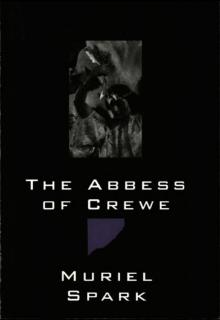 The Abbess of Crewe: A Modern Morality Tale
The Abbess of Crewe: A Modern Morality Tale Reality and Dreams
Reality and Dreams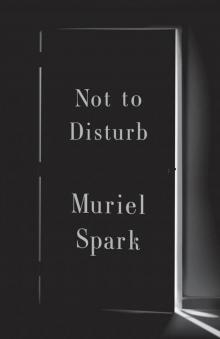 Not to Disturb
Not to Disturb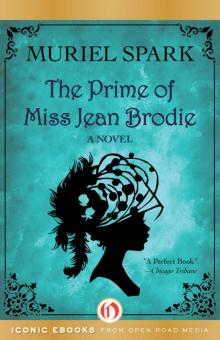 The Prime of Miss Jean Brodie
The Prime of Miss Jean Brodie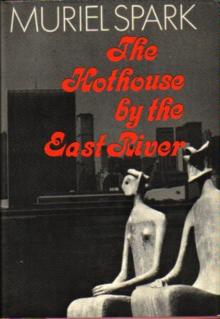 The Hothouse by the East River
The Hothouse by the East River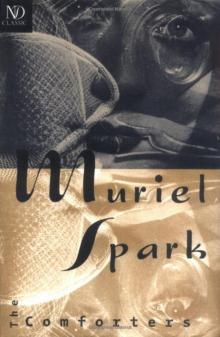 The Comforters
The Comforters (1958) Robinson
(1958) Robinson Unknown
Unknown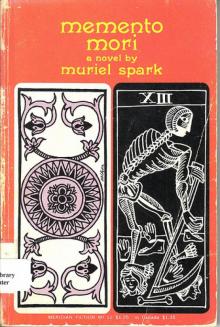 Memento Mori
Memento Mori The Finishing School
The Finishing School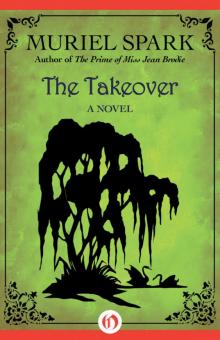 The Takeover
The Takeover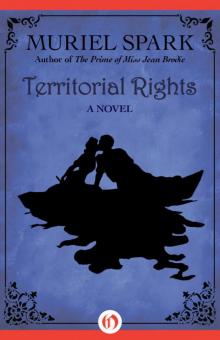 Territorial Rights
Territorial Rights The Complete Short Stories
The Complete Short Stories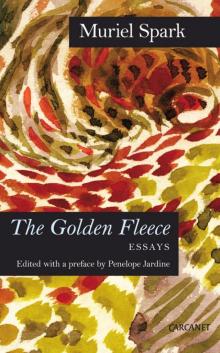 The Golden Fleece: Essays
The Golden Fleece: Essays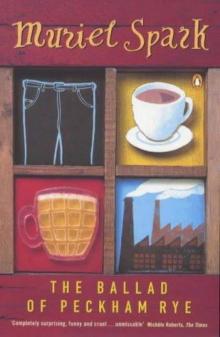 The Ballad of Peckham Rye
The Ballad of Peckham Rye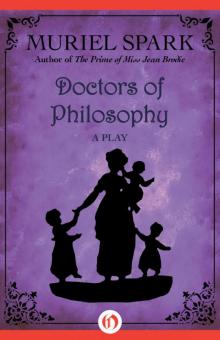 Doctors of Philosophy: A Play
Doctors of Philosophy: A Play The Mandelbaum Gate
The Mandelbaum Gate Loitering With Intent
Loitering With Intent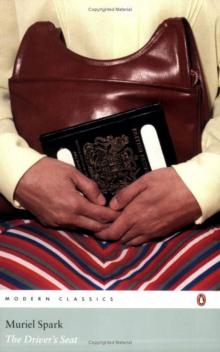 The Driver's Seat
The Driver's Seat Complete Poems: Muriel Spark
Complete Poems: Muriel Spark Symposium
Symposium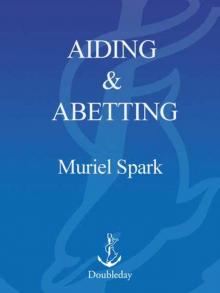 Aiding and Abetting
Aiding and Abetting The Golden Fleece
The Golden Fleece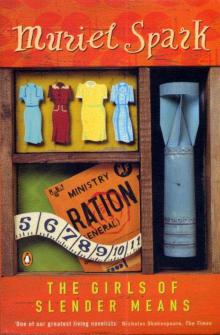 The Girls of Slender Means
The Girls of Slender Means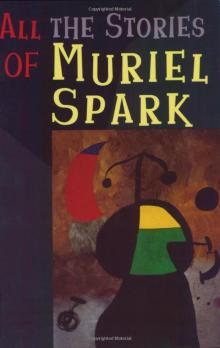 Alice Long’s Dachshunds
Alice Long’s Dachshunds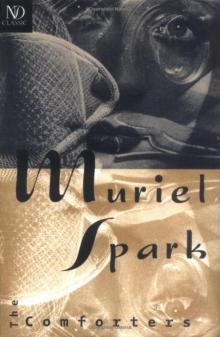 (1954) The Comforters
(1954) The Comforters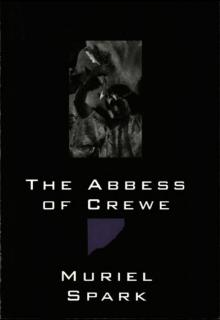 The Abbess of Crewe
The Abbess of Crewe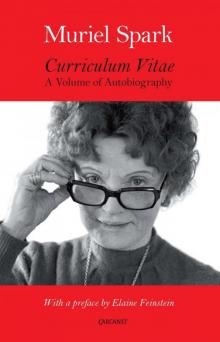 Curriculum Vitae
Curriculum Vitae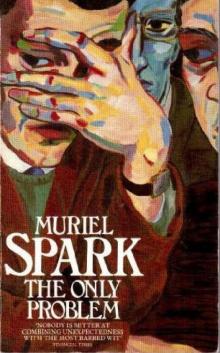 The Only Problem
The Only Problem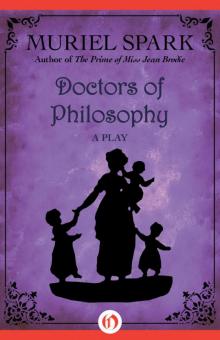 Doctors of Philosophy
Doctors of Philosophy